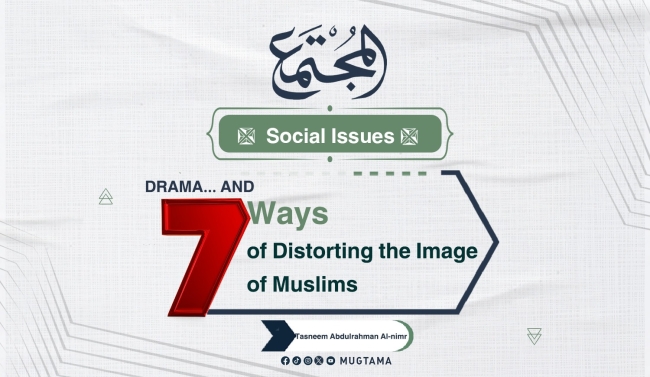Drama... and 7 Ways of Distorting the Image of Muslims
Recently, TV series have begun portraying Muslims in negative stereotypical ways that have nothing to do with truth or reality. This article will highlight the main aspects these shows focus on regarding the character of a Muslim man or woman—whom the creators label as "religious"—and to what extent these portrayals are unfair and do not represent reality:
1- The Endless Stereotyping of Muslim Women
The portrayal of Muslim women follows a predictable pattern: she is either a helpless, submissive character who obeys her parents' decisions on life-altering matters such as education and marriage without expressing any opinion or objection, or she is a domineering, oppressive woman who selectively follows the commands of Allah and the Prophet ﷺ when they align with her desires while ignoring the rest.
However, Islam grants women the right to choose in matters such as education and marriage or any other issue, as long as it does not contradict the laws of Allah.
2- The Male-Dominated Mindset Among Conservative Women
Conservative women in these series are often shown as blindly upholding male superiority simply because of gender. For example, a mother-in-law—who is supposed to represent a devout and pious woman—is depicted as unjust toward her son's wife, even when the latter is betrayed or oppressed, merely because the wrongdoer is her son. These women are portrayed as constantly excusing and defending men just because they are men. On the other hand, feminist-leaning female characters always support women, whether they are right or wrong.
Both perspectives contradict Islamic teachings, as Allah says: "Whoever does righteousness, whether male or female, while they are believers—We will surely cause them to live a good life, and We will surely give them their reward [in the Hereafter] according to the best of what they used to do." (An-Nahl: 97)
3- The Transformation of Conservative Women in a Manner That Violates Islamic Teachings
Young, hijab-wearing girls are often portrayed engaging in behaviors that completely contradict Islamic teachings. They are shown engaging in premarital romantic relationships, displaying disrespectful behavior toward their parents, or even being alone in a private setting with an unrelated man—actions that Islam strictly prohibits.
4- Favoring Non-Religious Characters as the Most Likeable Ones
In these series, the most admired characters—those portrayed as noble, kind, and ethical—are almost always those who have no connection to religion. These same characters engage in major sins, such as drinking alcohol, committing adultery, and ignoring Islamic dress codes. There is a clear attempt to normalize and beautify sinful behaviors by associating them with pleasant, well-mannered characters.
Meanwhile, the deceitful, cruel, or oppressive characters are often the ones depicted as religious. If a religious character is portrayed positively, they are usually a secondary figure with little to no impact on other characters or the overall storyline.
5- Normalizing Adultery While Demonizing Divorce
Some conservative female characters in these series are shown as being unbothered by their husbands committing adultery multiple times, as long as they remain married and he does not intend to divorce them. These women are depicted as considering divorce a far worse offense than adultery. This portrayal distorts reality, as Islam condemns adultery as a grave sin, while divorce is a permissible solution when needed.
6- Condemning Early Marriage for Women
These shows present the idea of conservative families encouraging marriage for their daughters under the age of twenty as an inhumane act that deprives women of education and the chance to build a respectable life. However, this generalization is misleading. Many women who married young and had children early are happy and have even pursued their education later in life. Conversely, many women who delayed marriage are unhappy or have experienced divorce. The reality varies for each individual, and the key factor in deciding marriage should be Islamic guidelines rather than societal or feminist preferences.
7- Reducing Religious Commitment to Clothing and Quoting Religious Texts
Wearing the Islamic hijab is an obligation for every Muslim woman, and quoting the Quran and hadith is essential. However, the issue in these shows is the shallow portrayal of religious characters—focusing only on their external appearance while disregarding the essence of practicing Islam in daily life.
It would be beneficial if these dramas stopped confining the image of a Muslim man to someone who merely prays and quotes religious texts, yet is portrayed as harsh, unapproachable, and feared by his children. Similarly, Muslim women are repeatedly depicted as either victims of a merciless society or as hypocritical, power-driven individuals who observe only the external aspects of religion while causing harm to those around them.
In an era dominated by social media, television, and streaming platforms, it is high time that those responsible for producing these works adopt a fairer and more realistic representation of Islam and Muslims. They should approach Islamic teachings with accuracy and integrity rather than distorting them to fit misleading narratives.
-------------------------------------------------------------


